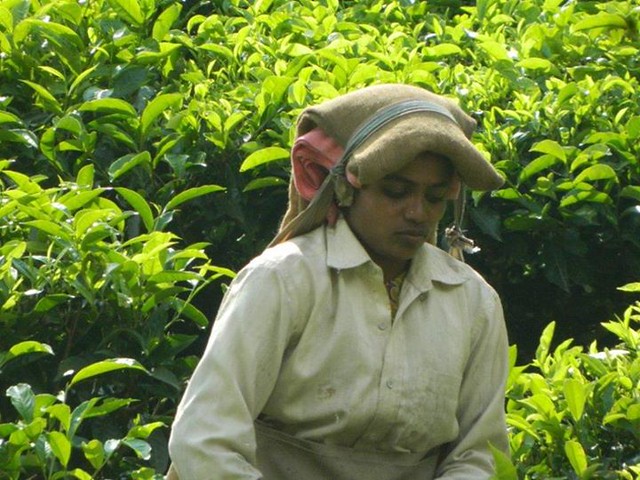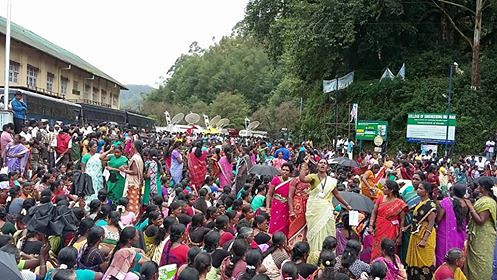By Shafeeq Hudawi, TwoCircles.net
Munnar: In Kerala, elections at nearly all levels have been about either the United Democratic Front or the Left Democratic Front, with these coalitions nearly always splitting the bounties of electoral mandates. In November however, the two behemoths of Kerala politics received a jolt, mild to say the least, but one that has all the elements to blossom into a full-scale earthquake, and result in tectonic shifts in the local politics. As the entire nation waited for the outcome of Bihar elections, an all-women’s body-Pembilai Orumai-won three Gram Sabha seats in Munnar. They managed to trump the Left parties in their own bastion and signalled a break from the past: labour struggles no longer needed to depend on established trade unions for their movement. The strike in Munnar tea plantations are a beginning of workers, especially women, taking up matters in their own hands. And Pembilai Orumai has a big role to play in this.

The strike: A long-awaited explosion
Munnar is a well-known tourist paradise in the state of Kerala. Nestled in the Western Ghats, the hilly town attracts thousands of tourists every year. For a number of these tourists, the green, sloping tea plantations are a welcome site. But dig a little deeper and you will find that these supposed-paradises have long, grim tails to labour exploitation. Tea plantations, owned both by local musclemen and multinational companies, are known for treating their labourers in almost sub-human conditions: this, despite Kerala faring better than other states in terms of daily wages and amenities for the workforce.
The nine-day strike by women against the Kanan Devan Hills Plantations Company (KDHP) seeking minimum wage of Rs. 500 per day, up from Rs 232 per day and 20% bonus to the workers, was the result of years of facing hardships, with no solution or help in sight. Some of the workers who were agitating had been working for decades and their children had too been witnesses of the troubles that their mothers went through. Some of these children that Twocircles.net spoke to had long, harrowing tales of what their mothers suffered, and they are smart enough to see through the facade of “facilities” that they were provided.
“We get free check-up and medicine from the hospital at Thettamala Tea Estate. We need no ticket to watch the annual football tournament held here. We only need to tell them of the number 13/ 17 Kollil Nabeesa, my mother, who has been working in the tea plantation in Munnar for last 40 years. You might be thinking that these privileges are given us freely. But even for these basic facilities, my mother is charged an amount every month,” says Naseer Gazzali, who has grown in the plantations.
Nabeesa took up the job in 1969. For the first 11 years, she was paid Rs. 16 per day as she was in the local category. After she was promoted to permanent category she was given a slight hike. When she retired in 2010, her wage was Rs. 85. Now she gets Rs. 475 per month for 33 years of service.
“For my mother, like hundred others in Munnar, the work started at 6 am. She had to reach the block, fixed by the company before 8 am. During winters, my mother would shiver in the cold; during monsoons, she would continue working even during downpours. The labourers are bitten by millipede and most of the evenings I saw blood marks on my mother’s legs after she arrived home,” adds Naseer.
Till now, the workers have to pluck at least 14 kgs of tea leaves per day to meet their daily target.
It was in these conditions that the women decided to speak to the authorities.
A report by India China Institute, called “Minimum wage violations perpetuate modern-day feudalism on Assam’s tea plantations” shows that despite an expected industry turnover of Rs. 33,000 crore by 2015—roughly $5.4 billion dollars—tea plantation workers earn the lowest wage of all organised sectors in India. In Assam, tea workers earn Rs. 94 per day (about $1.5). This is far below the state’s statutory minimum wage for unskilled labourers of Rs 169 per day. In Kerala, another major tea producer in India, workers earn almost three times more Rs. 254 per day, which is Rs. 30 over their state’s minimum wage. The wage in Assam is even more unfathomable when compared to the retail price for the very tea being produced in the gardens; 125 grams of Twinings’ “Assam” loose leaf tea costs $12.95, or Rs. 777, over eight times the daily wage of the labourers who pick it”.
Add to this, the fact that a majority of workers in Munnar are Tamil migrants, living in social isolation with little to be offered in terms of alternative livelihood or social mobility. The free schooling that Kanan Devan Hill Plantations provides is only up to lower primary level, which, given their meagre income, deeply inhibits their children’s growth. As mentioned earlier, there are several deductions on food rations, electricity and medical expenses which keep the labourers at a near-poverty level. All this went on, even as Tata Global Beverages raised its stake in KDHPL from 19% to almost 30%, making it an associate company with significant influence in deciding operating and financial policies.

Against this backdrop, when a discussion between the tea plantation management, representatives of women labourers and trade unions, on bonus payments to tea workers on September 2 failed to bring out a consensus, the women decided to go on strike.
“No doubt, these labourers are the most cruelly exploited community in Kerala and to some extent, in the country. And this strike was nothing other than a long-awaited explosion,” says Anwar Balasingham, a social worker, who has been working for the development of the women labourers.
Why Trade Unions Were Shunned by the Women
On September 3, tourists in Munnar were witness to a special moment albeit not what all of them would have wanted. Workers in the Periavurrai Lower Division garden launched the strike by disagreeing to join the duty and came to the headlines as the estate was affected by the strike. In the coming days, the strike was disseminated to 118 hectares long Periavurrai Lower Division garden, which had more than 11,000 tea-leaf plucking labourers. The labourers began to throng into the main office of KDHP. Munnar came to a standstill as the roads turned into sea of women workers. The Kochi-Madurai Highway was entirely blocked for nine days, drawing the attention of the entire state along with the political leadership of Kerala irrespective of party and front.
But none of this was due to the actions of the trade unions, which have for long, almost monopolised every worker’s struggle in the state. Far from it, the women at Pembilai Orumai did not even care to entertain them or let them have a share of the ‘struggle’. The success of Munnar strike follows a series of women labour strikes in Kerala which had a successful end without the support of mainstream trade unions. The strike by the textile shop floor workers demanding better working hours, nurses’ strike in private hospitals, unorganised sectors workers; all were offered only little support by the trade unions. Munnar is latest in this series.
Under the aegis of Pembilai Orumai, they expressed their huge ire against the management as well as the political leadership of Kerala.
Though the plantation union leaders became MLAs, they turned a blind eye towards the woes of poor labourers. This negligence sowed discontent not only towards the plantation management but towards the people’s representatives.
“It also highlighted the need to address how patriarchy is inherent to the structure and functioning of labour unions in the country. The rise of Pemblai Orumai, the way they organised, took decisions, and supported each other exposed the usual strategy of having token woman member in your team as a farce. It was humiliating for the trade unions,” says Chitra Vijayakumar, another social worker at Munnar.
“The management tried to quell our anger through union leaders. But, we didn’t allow them to intervene in our strike,” says Gomathi Augustine, the Pembilai Orumai leader.
During his visit, former CITU leader and Munnar MLA S Rajendran was confronted with slogans and attack against him.
“Their anger broke out while the women labourers attacked Rajendran with sandals. The MLA had to be given police assistance to flee the scene,” says Balsingham. The state BJP state awaited the same fate when they visited Munnar. “We made them flee from the town. They had to do nothing with us and the demands we raised,” Gomathi says.
The only exception, which probably explains how deep the political understanding of the agitating workers is, was the exception made for former Kerala Chief Minister and present Opposition leader V S Achuthananthan. The veteran Communist leader spent the whole day with women protesters on September 13.
“Unlike other leaders, VS deserves respect of these labourers. It was the VS Government which distributed title deeds to more than 2,000 landless families during its regime,” says Balasingham.
“It was widely acknowledged that the trade unions were acting as the representatives of the tea plantations’ management, and were attempting to sabotage the strike right from the beginning. So the slogans that Pembilai Orumai raised were not only against the plantation management, but also against the trade unions. Which is a crucial moment, a pivotal point in the way we think of labour movements in this country,” added Vijayakumar.
Balasingham says that the trade union organisations were intolerant towards the Pempilai Orumai.
“The trade union leaders didn’t take the Pembilai Orumai leaders along with them during while negotiations were held with the planters demanding Rs 500 daily wage. They argued that these women were not part of the Plantation Labour Committee. So these poor ladies were denied the opportunity to attend the discussions,” he says.
One Small Election Win; One Giant Step for Worker Rights
While Pembilai Orumai decided to field candidates in the local body elections in four panchayats of Idukki district, it left a clear message to the mainstream political parties in the state. The candidature of the organisation’s functionaries was perceived a move, motivated by the temporary frustration towards the ruling and opposition fronts in Kerala.
On November 7, an electoral surprise was reported from Munnar when three candidates of Pembilai Orumai emerged victorious in election. Organisation leader Gomathy Augustine won the seat of Devikulam block panchayat, which was the bastion of left parties, while two other candidates, Vellathayi and Mariyammal won in their respective seats in the Munnar Gram panchayat. Gomathi was assaulted by left-party activists as the development came a set back to them. Gomathy sustained minor injuries when she was assaulted during a victory procession.
The attack continued that night too while a group of four trade union activists assaulted Gomathi’s husband and sons in their house. Though Pembilai Orumai registered two complaints the police made no arrest citing they failed to identify the suspects.
However, Munnar strike has emerged an emulative model for the tea plantations in Idukki and Wayanadu, where thousands are working under the same plight. Activists say that strong ire is looming over at these plantations among labourers as they are ill treated by the managements.
In Munnar, the LDF won 10 seats while UDF won 9, and both were pinning their hopes of Pembilai, which won two, for support, but the party made it clear that it would support no one. It was a clear message: if you are not part of our struggle, you are not a part of our achievements.
